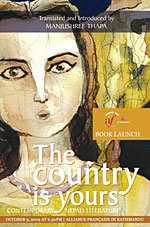 |
Translation is a tussle with the impossible. Yet it is fundamental to the word. There is a persistent and misguided conception that translation consists simply of the substitution of words from one language to another.
This is an ignoramus mistake. It misinterprets and fundamentally misunderstands the word. No word can be substituted by a word from another language and match it identically for meaning, influence and association. This disparity in translation is accentuated when one takes on the task of translating between two radically different languages: Nepali and English.
Nepali is a language that floats upon inflections. The subtlest change in tone, the vibration of a word or the enunciation of the end of a sentence, can completely change its meaning. It is here that not only gender, size, shape and emphasis are defined but subtleties of character, attitudes, and moods are also communicated. For a Nepali, English is a language that is more conceptual and specific. It is the language of science and technology.
Anyone who has tried their hand at translation, indeed any reader, will have experienced the different analytical strands and imaginative possibilities that are inherent to any original work. The very essence of quality lies within this experience. The better the work, the more the possibilities of interpretation and the harder it is to translate. The translator must rely on approximations while being aware of the multitude of interpretations that any original work possesses. A good translation is always attempting to convey the multitude of interpretations combined with the mood, tone and rhythm of the original. A wise translator is one who knows the limits of translation and nonetheless takes on the impossible. However, a good translation, while acknowledging this, is able to capture the quality and soul of the original work.
Good translations of Nepali works are few and far between. In this sparsely populated literary landscape, today's launch of Manjushree Thapa's translated anthology, The country is yours is a welcome new addition. In fact, Thapa has long been working in the field of literary translation, including in association with the Nepali Times.
It is undoubtedly important that more Nepali literature be translated into English and other foreign languages, not least because it introduces the wealth of Nepali literature and Nepal's unique cultural and historical perspectives to the global scene. It also provides a basis for foreigners and Nepal's own extended diaspora to get a more intimate introduction to the country.
However, in a country where translations are a rarity, it is often the case that the translation gets more attention than the original. While a good translation is important, the original literature is essentially the defining standard of its quality. As with all great works of literature in translation, I hope that Manjushree Thapa's efforts are judged in terms of literature, rather than as a contest of translation.
Pranab Man Singh is a freelance writer and a part of Quixote's Cove: the bookshop. For further details on the launch of 'The country is yours' (Alliance Francaise, 6.30pm, 9 October), please visit www.qcbookshop.com.


